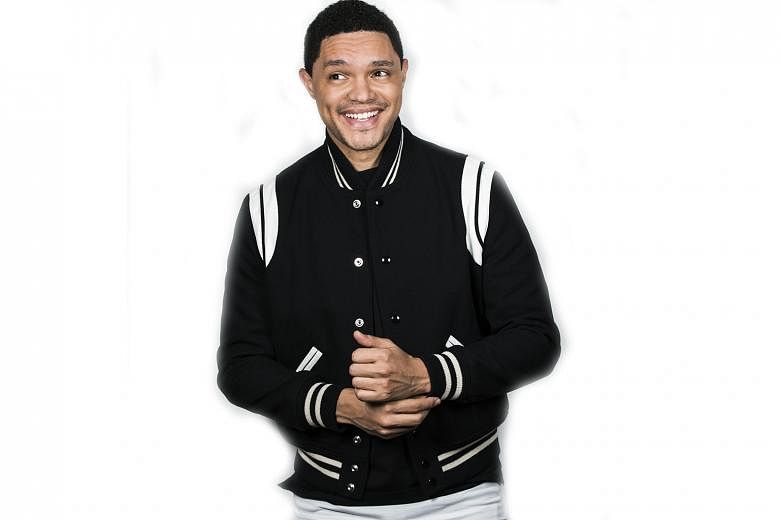NEW YORK • Trevor Noah, the host of news satire programme The Daily Show, was on holiday when he first heard about the death of black American George Floyd, who had been restrained by a white police officer.
Rather than wait the full two weeks for his show to return, Noah jumped online and uploaded an 18-minute video to YouTube, sharing his feelings of sadness, fatigue and optimism with close to eight million subscribers.
Noah said: "You quickly realise that while everyone is facing the battle against coronavirus, black people in America are still facing the battle against racism and coronavirus."
Since then, he has kept his online and television performances squarely focused on the biggest civil rights questions of the day, routinely interviewing leading black intellectuals, activists and athletes on The Daily Show (1996 to present) while probing the nature of the United States' failed social contract on race.
Noah spoke to Bloomberg News about using his comedy show to dissect the prevalence of racism in the US, what it is like to tape his show from home and who his ultimate dream guest would be.
For about three months now, you have been hosting your show from home. What is it like performing in your apartment with no audience?
Coronavirus hit the world harder than anybody thought. The next thing you know, we were told to stay at home and that is what we all did. I genuinely do not think too much about having or not having an audience. I spend more time thinking about how to process the experience.
How do we exist in a normal world that is completely abnormal?
Have you spent any time watching your peers?
I cannot look to my peers because in this space, my peers have no experience. It is a completely new world. If anything, I look to the pioneers who created audience-less shows - the YouTubers.
A key difference between the show now and before you took over it has been your aggressive use of social media platforms. How has that changed your comedy?
When I joined the show, I was not trying to incorporate YouTube or Twitter. These are real things that exist that I use. I just said: "Let's use it in the most organic way possible." That is a by-product of who I am. I am younger than most of the hosts.
A lot of people look to topical comedy shows to stay informed. How do you balance the desire to make a joke with making sure your viewers are getting the best information?
The first thing you need to ask yourself is: If you only inform, what separates you from the news?
It is also weird because in the US, a lot of the news is not informative. It is entertainment-based. But there are amazing journalists and great news out there.
I am not delivering the news. If anything, my team and I are working to distil and decipher what is happening, not just in the news, but in the world.
At least two of your peers have apologised in the past few weeks for previously dressing in blackface. Should they have been punished? Do you buy the idea that this time is going to be different?
They understand that despite their intentions, people were extremely hurt by this thing they participated in.
I get where Jimmy Fallon and Jimmy Kimmel were coming from. They were trying to play a character. They were not doing a mimicry of black culture or black people.
But understanding the adjacent legacy of these two things - maybe they discovered that only over time. Those hosts, like many other people in the US, are now wondering: "What are those things we are doing that inflict pain in ways we may not have understood?"
Comedy is an entertainment format approved mostly by society. Yes, Fallon performed in blackface on television. You also have to ask: Who approved this? Who are the people who watched and thought it was fine?
What do you think about social networks that have been criticised for amplifying hatred or misinformation, but argue they are only reflecting the values of their users?
We cannot live in a world where companies such as Facebook, Twitter and Instagram claim to have no power over what is happening.
It would be like if I said "I am completely against all forms of animal abuse", but I forward animal-abuse videos to everyone in my phone book.
Is political correctness in contemporary culture a legitimate concern or just a sign that what is funny has changed?
Partly a change in what is and is not funny, but also a change in how we hear people's voices.
For a long time, people did not have the means to tell you they did not appreciate what you had done. If someone made a television episode that was considered offensive, how many letters did you have to write to get an effect? Now, thousands of people can immediately lambast a show.
I have always said that as a comedian, you move with the times. Some comedians do it and some do not.
Who is a guest you would love to have for the first time?
Rihanna and Beyonce. I have been genuinely impressed and intrigued by their journeys of going from just being perceived as female singers who are sex symbols to leaders who encourage discussions on some of the toughest topics.
That is something not every artist has done and not many have even tried to do.
BLOOMBERG

